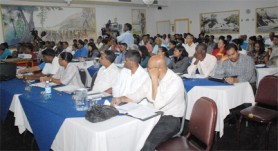Guyanese-born Lal Balkarran who is resident in Canada and who is credited with the compilation of the world’s first dictionary on auditing says in his paper titled Fraud and Corruption: Auditing and Investigation that almost a third of business failures worldwide are attributable to internal fraud and the fraudulent and corrupt practices account for revenue losses totalling as much as seven per cent. Senior management and executives are culpable in the perpetration of a high percentage of such frauds which, Balkaran says, is largely attributable to “a lack of adequate internal controls and pressure on perpetrators to maintain an expensive lifestyle.
And Balkarran, who participated in yesterday’s one-day workshop on fraud prevention, detection and investigation at the Hotel Tower organized by the Guyana Chapter of the Institute of Internal Auditors (IIA) has frowned on wrist-slapping, glossing over, the issuance of warnings and the retention of fraudsters on organizations’ payrolls. “It is important that audit committees insist that perpetrators of fraud are always fired. This sends a powerful message throughout the entity that fraud will not be tolerated in any form,” Balkarran says.
Balkarran, a published writer, with more than thirty years of internal auditing experience says in his paper that fraud has become a burgeoning industry in the United States with the monetary cost of fraudulent acts jumping from an estimated US$700 billion in 2006 to US$1 trillion last year.
Balkarran’s wide-ranging assessment of fraudulent acts and their consequences also examines the phenomenon in developiong countries, where he says fraud has devastated poor people and is stifling fledgling democracies and distorting economic policies. “The social costs are monumental as more misery and more poverty emanate due to less social services brought about by the lack of funds lost through fraud and corruption.” Statistics contained in the Balkarran paper indicate that US$42 billion earmarked for aid to Africa was found in Swiss banks while an estimated US$67 billion was lost to fraud and corruption during the regimes of Presidents Marcos and Estrada. According to the paper, the wanton selling off of state entities to relatives and friends “at bargain basement prices” in China accounted for losses to the state totalling around US$70 billion.

At yesterday’s workshop Balkarran underlined the importance of a culture of honesty, high ethics, and transparency and accountability at the highest levels of organizations as central elements in the fight against corruption. “The very work environment either fosters or discourages corrupt practices. Alluding to the existence of organizations “with a poor corporate culture and a negative tone at the top, where everybody steals,” Balkarran says in his paper that one consequence of such a work environment is increased production costs which are then passed on to the consumer in the form of higher prices. “As new recruits join the organization they too are trained in how to steal and the vicious cycle continues,” he adds.
Balkarran is calling for a more assertive role by audit committees in assessing the integrity of the culture and “the tone at the top” within organizations, and in ensuring that adequate processes and controls are in place to minimize fraudulent practices. The fraud prevention expert is also advocating the institution of appropriate codes of ethics and ethics programmes as well as the creation of effective “whistleblower processes.”
Alluding to the role of auditors in combating fraud, Balkarran says that internal auditors are expected to have a greater understanding of the business and its risks when compared with other governance stakeholders: “It is the internal audit’s function that is one of the Board’s most powerful mechanisms for understanding the full spectrum of the key risks facing the company and monitoring the effectiveness of related controls and risk management processes.” Balkarran says that if internal auditors are to be truly effective they must “review, understand and apply the updated IIA’s Inter-national Professional Protection Framework (IPPF) which embodies the definition code, standards, practice advisories, position papers and practice guidelines. In his paper Balkarran also alludes to the responsibility of the chief audit executive “to report periodically to senior management and the board on the internal audit activity’s purpose, authority, responsibility and performance relative to its plan. Reporting must also include significant risk exposure and control issues including fraud risks, governance issues and other matters needed or requested by the Board.”
In respect of external auditors Balkarran says that “outside auditors have a responsibility to plan and perform the audit to obtain reasonable assurance about whether the financial statements are free of material, whether caused by error or by fraud.” According to Balkarran external auditors can also help to identify instances in which the culture of companies may be shifting in the wrong direction “and should provide audit observations on what they see occurring behaviourally and culturally as well as what they consider to be leading practices.”


